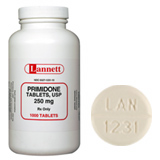Primidone Pet Medication

- Dog
- Availability: Prescription
- Active Ingredient(s):
- What is Primidone used for?
Primidone is an anticonvulsant used by veterinarians to control seizures and epilepsy in dogs.
- How Primidone should be used?
Primidone is FDA approved for use in veterinary medicine. The usual dose in dogs is 5-15mg/pound per day in 2 or 3 divided doses.
- What are the side effects?
Side effects of primidone may include anxiety and agitation as well as increased thirst, urination and appetite.
- What special precautions are there?
This product should not be used in cats. If administered to a cat do so only under extreme caution. Do not use in dogs with dehydration, anemia, Addison’s disease, heart disease, kidney or liver disease and respiratory disease. Do not use in pregnant or nursing animals or in dogs allergic to barbiturates. Acetazolamide may decrease absorption of primidone. CNS depressants, valproic acid, and chloramphenicol may increase the effect of primidone. Primidone may decrease the effect of Coumadin, corticosteroids (such as prednisone), beta blockers (such as atenolol), quinidine, theophylline and metronidazole. Use with caution when giving with furosemide, griseofulvin or Rifampin. This product can be given with or without food. Some veterinarians recommend giving Denosyl (SAMe) while giving primidone to benefit the liver.
- In the event of overdose?
Contact your veterinarian or veterinary emergency room. Symptoms of overdose may include depression, increased thirst and urination and hunger, sedation, increased heart rate, skin disease, hyperventilation (panting), vomiting, kidney disease, liver disease, coma and death.
- How should I store Primidone?
Keep this medication in the container it came in, tightly closed. Store at room temperature, away from excess heat, light and moisture. Do not store in the bathroom. Throw away any medication that is outdated or no longer needed. Keep out of the reach of children and pets.
Disclaimer: The information on this site is for educational purposes only and should NOT be considered veterinary advice. Any veterinary questions should be referred to your veterinarian. This information is NOT to be used for diagnosis or treatment of your pet. Please make your own inquiries with your veterinarian for the suitability of a product for your pet.




